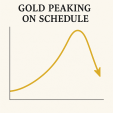What is Money?
Money is whatever people agree it is. At various times and places in history, money has ranged from sea shells and gold coins to paper currency and now electronic debit cards. The form of money is not important; money merely symbolically represents economic value in a convenient and commercially acceptable form. Value is a subjective psychological concept, independent of the mechanical aspects of economics. This psychology is what really drives the business cycle.
Barter preceded the use of money in economic transactions. If I had a pig and wanted a tent and you had a tent and wanted a pig, the ensuing wrangling and eventual swap is the basic origin of economics. The other option is for me to take the tent by force, if I think you won't kill me first. Modern economic transactions derive from this humble beginning.
The techniques of making the process of buying and selling easier should be called physical economics. The process of setting the value and worth of an item; determining whether anyone wants or needs it-this should be called psychological or even, cultural, economics.
Money falls in the sphere of cultural economics. The value of money is determined by the goods and services it can buy. When I was a teenager in 1967, I did yardwork for twenty five cents an hour; taking that quarter to the grocery store I could purchase five candy bars. In the nineties, candy bars cost, when they are on sale, about five for two dollars. The value of a quarter in 1967 was five candy bars. In 1998, a quarter's value is between one third and one half of ONE candy bar. Obviously, the psychology of a teenager working for twenty five cents an hour would be different in 1967 and 1998!
The value of money is also a matter of perception. The currency of the United States has economic value simply because there is a general consensus that it does. When you walk into a store and buy a can of green beans, the grocer expects payment. This payment must be in a mutually agreeable form, or he charges you with theft. The buyer and seller must not only agree on price, they must agree on method and means of payment. the transaction involves setting a price the seller thinks is profitable. The buyer must also think the price is reasonable, or he won't pay it. The method of payment is determined by whether the seller trusts the buyer enough to extend credit or not. Instant payment or deferred, depending on the level of trust involved.
Finally, both must agree on the means and form of payment. This can be the sea shells we mentioned earlier, or in our society paper and increasingly electronic debit and credit cards. In any event, what people think influences their economic choices more than is thought. Economics is much more the study of how people think about economic matters, than a statistical analysis of various indicators and indexes.
In our advanced economy, techniques have been developed to speed the method of payment. We have devised a sophisticated system based upon credit and debit cards with instant verification through our telecommunications system. This "plastic", and not just any plastic either-try paying the grocer with the plastic lid of a milk jug and see what happens-is rapidly becoming our economic foundation: the cash less society foreseen so long ago.
The seller sets the value of money equally with the buyer. Or rather, the "system" sets the value of the money. The system presupposes that both the buyer and seller will act in a trustworthy manner. A certain amount of untrustworthiness is built into the system, but beyond a certain level the system will collapse.
Likewise with paper, coin and now electronic currency, the value is mutually set by cultural consensus. Toilet paper has no economic value as currency in modern American culture, although it does have a vital role in our society. In normal times, a five dollar bill is valued more than a single piece of toilet paper, even though they are both paper. When the value of our paper money equals that of toilet tissue, you can be certain that the economy is in trouble. This is known as the toilet paper/paper currency school of economics.
Coinage is metal minted into a commercially useful form. Gold and silver are minted because we value them, or rather we recognize they combine both value and worth. Zinc and lead are not because we don't value them as currency. However, the ancient Greek Spartans used lead as money and the Nazis used zinc coins during World War 2. This is another example of money being anything people agree that it is. Since lead money is very heavy, it has little use in a modern economy, although it would discourage bank robberies.
Zinc coins were legal tender in the Third Reich and not legal tender in the Allied countries. The reason was that the Allied peoples and governments said zinc coins had no value. These zinc coins could purchase nothing because sellers refused to accept them. They could not be used to pay wages, pay debts, or buy anything at all. To have value, money must be sanctioned by government, accepted by people and trusted by the business community.
If one doubts the governmental role, think of Germany's Weimar Republic of the 1920's, with its wheelbarrows full of paper currency to buy a loaf of bread: no governmental stability, no money. Or just take a look at Indonesia in 1998. If one doubts the role of the people in accepting currency, think of the Susan Anthony dollar coins gathering dust in warehouses because the people detested them. Or just take a look at Indonesia in 1998. If one doubts the role of the business community, think of why no one will accept payment in Russian rubles. If the ruble gets any worse, they should just rename it the rubble, as in pile of. Or just look at Indonesia in 1998.
| The fundamental value of currency, paper, coin and credit, is the psychological assessment people make of it. We talk about money being backed by the full productive capacity of the U.S.A, but this is simply what the people using the currency wants it to be. The value of money is simply what people think it is: no more and no less. The reason gold and silver are so despised in our modern economy is that they back themselves. And gold and silver show the sham of "the full faith and credit of the U.S.A". |
If the value of money is a subjective psychological assessment by people, then money's worth is more of an objective judgment. The worth of money is related to its intrinsic worth as a precious metal, an objective measurement of current economic production, and a means for predicting future economic activity.
A fundamental distinction must be made between value and worth in economic matters. They are not the same thing. Value is a psychological assessment by people of a particular item expressed in money. The money value of an item may go up or down. Value is subject to wild speculative swings based upon numerous factors totally beyond logic or reason. This unpredictability in valuation is the root cause of all economic depressions. Speculative excesses or inflation push value to an artificial and unrealistic level, well beyond worth. Eventually, the value of something becomes unsustainable and is forcibly equalized with worth. If this happens slowly and orderly, it is called a recession; if triggered suddenly, a depression. The difference is that between a balloon being popped with a pin, or having the air let out slowly. In recent years we have seen speculative real estate, precious metals and oil "balloons" be popped.In 1998, the U.S.A. is on the verge of a massive stock market "balloon popping".
Hijacking terms from geology, an economic depression can be compared with a major earthquake. Recessions can be compared with tremors, accepting every rattle and shake does not an earthquake make.
Scientists tell us that earthquakes are caused when pressure is released suddenly along a fault line between two plates. Actually, they use words like subduction zones and tectonic plates, proving both scientists and economists have a gene causing them to use words the rest of us can't understand. However, neither scientists and economists come close to lawyers and politicians in this ability. The federal budget, with its recent "surplus" is a masterpiece of smoke and mirrors and gobbledygook.
Anyway, carrying this earthquake idea into economics, we can see the plate of value sliding under the plate called worth. All is well until a snag develops and value increases out of sync with worth. This value increase causes incredible pressure along the entire fault line(economy) until an economic earthquake occurs. This earthquake may be either a recession or depression, depending on the amount of "pressure" released.
The important thing is not the snag causing the economic pressure, whether it is real estate, oil, or the stock market. The important thing is not the trigger mechanism for releasing the pressure along the economic fault line, whether that be speculation, excess production or the Indonesia/Asia economic depression. The important thing is identifying when pressure begins to build, monitoring the level of intensity and attempting to relieve it or at least survive it when it is eventually released. Identifying when is a function of the media. Since the corporate media is loathe to actually report global economic reality, the job increasingly falls to the Internet. The role of the corporate media and their pet economic pontificators is to reassure the economic sky is not falling, at least not until after election day.
Eventually, doom and gloom prophets, such as yours truly, appear to complete the information cycle, or spin control cycle as I like to call it. I certainly hope there is profit in being a prophet of doom and gloom, as the Chamber of Commerce types will label me. No way would my opinions be allowed on a mainstream venue. Praise gold and silver, attack debt, trash the Federal Reserve-just what kind of subversive are you anyway?
Economists spend too much time and energy arguing over what snags the economy and causes pressure to build. They argue over why the business cycle implodes and causes depressions and recessions. And now in 1998, in their economic arrogance, they argue that we have moved "beyond" the business cycle into a new global age of "peace and prosperity". We'll see about that one within the next five or ten years. I will flatly state that no one has the faintest idea what really causes the business cycle to self-destruct into recessions and depressions. All we really know is that we don't know. I think a little more humility and less humbug is in order for society in general and economics in particular. However, we shouldn't carry the process too far – as unemployment would double if all the pontificating pundits were silenced. Economists should just stop taking themselves too seriously. There are enough politicians and feminists around doing that already.
I offer the appalling thought that there might be a simple answer-debt service and human nature. Perhaps the real cause of economic, and most other, distress lies in human nature. Speculative excess leads to economic success and soon to a redress of excess. The old if you get drunk you can expect a hangover school of economic theory. In the 17th century it was tulips in Holland, in the 18th the South Sea bubble; in our century it is now the stock market, again. The snag changes, the trigger mechanism changes, but the pressure is always released. The current snag is the 8500 stock market and the current trigger event will be Asia. The pressure will be soon be released again.
The relationship between an items assessed value and its worth is the critical economic issue of our time. Simply put, value will once again be brought alignment with worth. The global economy will undergo a wheel alignment, after enduring the debt potholes of the last fifty years. And this "wheel alignment" will not be a gentle thing. It cannot be. A "normal" recession, whatever that is, will not deal with the incredible levels of debt built up. It will not deal with anemic cash flows and a system bled dry of liquidity.
| Obnoxious debt loads and how to service them will be the defining economic issue for years to come. Debt service has become a leech sucking the vitality of the global economy. And in the back of everyone's mind will be the thought of whether to service debt. That is why Indonesia can take the system down with it. Because they may very well tell the IMF to keep its billions. Once that happens, all global debt will become suspect. |
Economic policy in the next few years will be primarily directed towards maintaining cash flows in order to service past debts. The political pain involved in this will be considerable, as will the temptation for a quick fix default. This situation can be compared to a low grade fever, debilitating but not life threatening, at least not yet. The link between politics and economics will become quite clear in the next few years. The central issue will be how to foster and maintain democratic principles in an excessive debt atmosphere. History shows that economics can directly affect the political culture of a country.
The linkage between value and worth has broad applications in both commodities and financial markets. Oil is the perfect example of worth exploding into excessive value and then imploding into worth again. In 1973 Middle Eastern oil was valued at one dollar a barrel and also worth one dollar a barrel. Arab nations, angered because of the Yom Kippur war and also the US dollar losing value through inflation because of the Vietnam War deficits, manipulated the oil markets. These artificially induced market gyrations changed the value, but never the worth, of 55 gallons of oil to between $10 and $35. Bankers, oil companies and oil producing nations loaned and spent money based on the temporary value of oil, rather than its intrinsic worth. Much to their horror, they found out value and worth are not the same. At one time, pundits were solemnly assuring the world oil would cost $100 a barrel by 1990.
What nonsense! If these pundits and experts had understood how people behave in the real world, they would have clearly seen value must always be the same as worth. the world economy will be dealing with the consequences of having borrowed against value instead of worth for the next generation.
| A simple explanation of Japan's economic crisis since 1990 is that they borrowed against the value of Tokyo land and not its worth. Does anyone really think Tokyo's real estate should be valued in dollars more than all the real estate in California? And even if anyone was that foolish, should a bank be foolish enough to loan money to buy such land based on such valuations? This is what happened and why Japan's banks, in combination with the Asian crisis, will take the world economy down with them. |
Real people in a real economy facing large price increases respond in two ways: first, they seek to increase supply and second, they ruthlessly cut demand. OPEC was doomed from day one by human greed, both theirs and ours. The immediate effect was economic chaos due to logistical disaster. The long term effect was an expansion of supply which led to the global oil glut of today. Value will always merge again with worth. Value may get out of sync with worth, but not for longer than twenty years or so. The silver and gold "speculative" valuations in early 1980 are another example. Gold was valued at $800 an ounce, but its worth stayed the same. An ounce of gold or silver will always maintain its worth through time.
| An ounce of gold or silver is worth roughly what it was worth in 1792. The reason its value has changed is because the paper "fiat" currency Has become debased through inflation, particularly since the late 1960's. The point being real worth has remained relatively constant for centuries. Valuation changes, worth does not. |
More relevant to the nineties is what happened to the value of farmland versus its intrinsic worth from 1975 to 1985. I submit the quaint idea that one acre of farmland should be valued at the price of what it produces can be sold for. This heresy would have avoided the entire farm debt crisis. Unlike paper money, the Federal Reserve cannot create "fiat" farmland! Several harsh lessons can be learned from the farm debt crisis. The first is that inflation is not a permanent economic condition. The second is that people think it is because of their initial anguish at high prices. The third is that people begin a mad rush to protect value. This stampede causes a speculative hysteria in economics and radicalism in politics. The fourth is that the eventual inflationary value collapse hurts people just as bad as the initial value inflation.
The upshot is that people begin in the frying pan, leap into the fire; then, leap back into the frying pan. I call this the frying pan school of economic analysis. The terms, fried and burnt apply to most investment choices by this stage. People are pouring money into stocks because they want to get a piece of the "action". Here we go again!

















